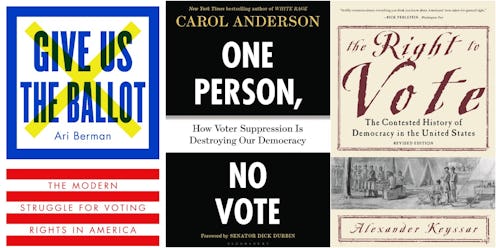Books
3 Books About The Messy, Complicated, And Discriminatory History Of Voting Rights

It's become a common refrain on social media: You counter a post about a mass shooting, a police shooting, or threat of a devastating executive order with "VOTE" or #GoVote or "Oh my god please, I'm begging you, vote." It absolutely makes sense. According to CNN, voter turnout in the 2016 presidential election was at a 20-year low. Even in 2008, considered a high point for the country's voting history, only about 64 percent of eligible voters punched a ballot. But despite its public persona — voting as a right, not a privilege, voting as ugh, so easy, so simple — voting has long been an act clung to tightly by certain populations. And for others, it's often been held out of reach. These three books on the history of voting rights will explain why it's more complicated than #GoVote.
The history of voting in the United States is a deeply fractured story, one frequently punctuated by racism, classism, and sexism. Americans often learn in school about the suffrage movement of the 1920s. It's an easily teachable moment in history — of course women should have the right to vote! But it's also, in part, a story of white women succeeding on the backs of disenfranchised African-American women.
The Voter Rights Act of 1965, signed into law by President Lyndon B. Johnson, is often heralded as a crowning achievement of the Civil Rights Movement. After all, it made illegal the common practice of denying or suppressing votes within minority communities. But Americans often lose sight of its course after the 1960s. We forget that a major provision, which kept a watchful eye over areas with a history of racially-motivated voter suppression, was deemed unconstitutional in 2013 by the Supreme Court.
Even today, voter identification requirements have sufficiently snuffed out eligibility for entire communities. Poll closures, combined with a lack of public transportation, physically bar people from casting their votes. Gerrymandering, the re-drawing of political boundaries to give a certain political party a numerical advantage, have stolen the voice of counties and states across the country. And we forget that for certain communities, the idea of fulfilling a civic duty for a country with policies and politicians who systematically chip away at your humanity isn't exactly a selling point.
So while voting, yes, is important and necessary and vital, you must understand its history when you step into that voting booth. Know that for many people, "just go vote" is much more complicated a request.
'The Right to Vote: The Contested History of Democracy in the United States' by Alexander Keyssar
In this incredibly informative tome, Alexander Keyssar walks us through the concept of American suffrage, from its birth amid the American Revolution to the end of the 20th century. Watch as the definition of "democracy" has evolved, and along with it the idea of the The Voter.
'Give Us The Ballot: The Modern Struggle For Voting Rights in America' by Ari Berman
Much of what Americans learn in school is anchored by the 1960s Civil Rights Movement. But what happened after what is often cited as the movement's crowning achievement, the 1965 Voting Rights Act? In this narrative history book, Ari Berman traces the success of and backlash towards the VRA, which, in theory, outlawed racially discriminatory voting practices, all the way to present day, even as new strategies of curtailing voting rights for minority communities continue to emerge.
'One Person, No Vote: How Voter Suppression Is Destroying Our Democracy' by Carol Anderson
A great companion to Anderson's White Rage, which chronicles the centuries-long tradition of white communities blocking the progress of African-Americans, One Person, No Vote shines a light on the devastating 2013 Supreme Court ruling known as Shelby. In Shelby County v. Holder, a key provision of the Voting Rights Act, which required counties with a history of discriminatory practices to submit any proposed changes to their voting procedures to a federal judge or the Department of Justice, was struck down. Since then, a wave of gerrymandering, voter ID requirements, and poll closures have swept through counties across the United States. Anderson dives deep into the Shelby aftermath and how it affects the present state of American voting rights.